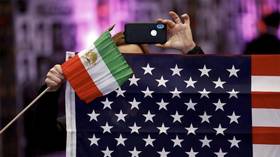PayPal freezes magazine’s paychecks for article mentioning Iran, citing US sanctions

Writers for a Jewish magazine in New York have had their paychecks frozen after PayPal flagged the transactions as a violation of US sanctions against Iran – because one payment included a note referencing the country.
Paychecks for nine contributors to Jewish Currents have been snarled in the ever-growing US sanctions dragnet, all because the ‘payment purpose’ field on one of them read “January plus Iran piece,” publisher Jacob Plitman told Gizmodo on Wednesday.
Nine paychecks of JC staff and contributors are currently being held by PayPal. The reason: we used the word "Iran" in reference to @DavidKlion's piece published last week. pic.twitter.com/zwgaM2EH7u
— Jewish Currents (@JewishCurrents) February 5, 2020
The perfectly innocent explanation – that “Iran piece” referred to an article the magazine had published about fallout from the Trump administration’s withdrawal from the Iran nuclear deal – has so far failed to secure the release of all funds.
Plitman submitted the check with the offending text on Sunday, triggering a warning that PayPal “might need to review” the payment addressed to David Klion, the piece’s author. Eight more checks the publisher subsequently sent – all free of the four-letter word of the moment – appeared to clear, and even generated confirmation emails, but the writers never received their money. Tens of thousands of dollars were suddenly in limbo, Plitman told the outlet, and PayPal would not let him speak to the security team supposedly handling the matter.
After two days of radio silence, PayPal reached out on Tuesday with a demand for “an explanation of the reference to ‘Iran’” and “the purpose of this payment, including a complete and detailed explanation of what is intended to be paid for.” Klion's money was ultimately released, but the other eight writers still hadn’t been paid as of Wednesday evening, and PayPal wasn’t responding to Plitman’s inquiries. He was forced to personally lend money to employees to cover “urgent expenses” like rent, he told Gizmodo.
The anti-Iran sanctions, administered by the Treasury Department’s Office of Foreign Assets Control (OFAC), have ensnared numerous innocent entities with no connections to the Iranian government – often for nothing more ‘criminal’ than having the word ‘Iran’ in their organization’s name or financial materials – in Washington’s effort to exert “maximum pressure” on the Islamic republic. Internet companies have shied away from doing business with Iranian users lest they run afoul of sanctions, and Google and Apple have even removed Iranian apps from their stores.
Also on rt.com Facebook ‘thought police’ censors pro-Iran posts ‘to comply with US sanctions’… as Trump warns Tehran against censorshipSuch ‘collateral damage’ may be deliberate, as the sanctions have been used to justify a wide-ranging crackdown on speech neutral or favorable to Iran, even when no sanctionable transactions are being made. Social media posts made in the wake of the US airstrike that killed Iranian General Qassem Soleimani and portrayed the Quds Force leader in anything but a negative light were removed en masse last month. Americans invited to an Iranian peace conference were visited by the FBI last August and told in no uncertain terms they’d be arrested if they went – even though the conference was moved to Beirut in the hope the Americans would be able to attend. It may merely be a coincidence that Jewish Currents’ Iran article excoriates the Trump administration and right-wing American Jews for backing the withdrawal from the Iran nuclear deal and celebrating the Soleimani killing, but the piece represents just the sort of ‘wrongthink’ that US sanctions have previously been weaponized against.
Meanwhile, companies like PayPal can point to heavy-handed sanctions enforcement by the Trump administration and claim their hands are tied when customers protest. In 2019 alone, OFAC levied $1.29 billion worth of penalties in 26 separate enforcement actions, its largest ‘take’ in over a decade. PayPal, already fined $7.66 million in 2015 for failure to “employ adequate screening technology” to detect sanctions violations, is likely to err on the side of caution. Nor is it the only payment processor blocking all mentions of Iran – money transfer app Venmo was found to be flagging both ‘Iran’ and ‘Persian’ last year.
Like this story? Share it with a friend!













